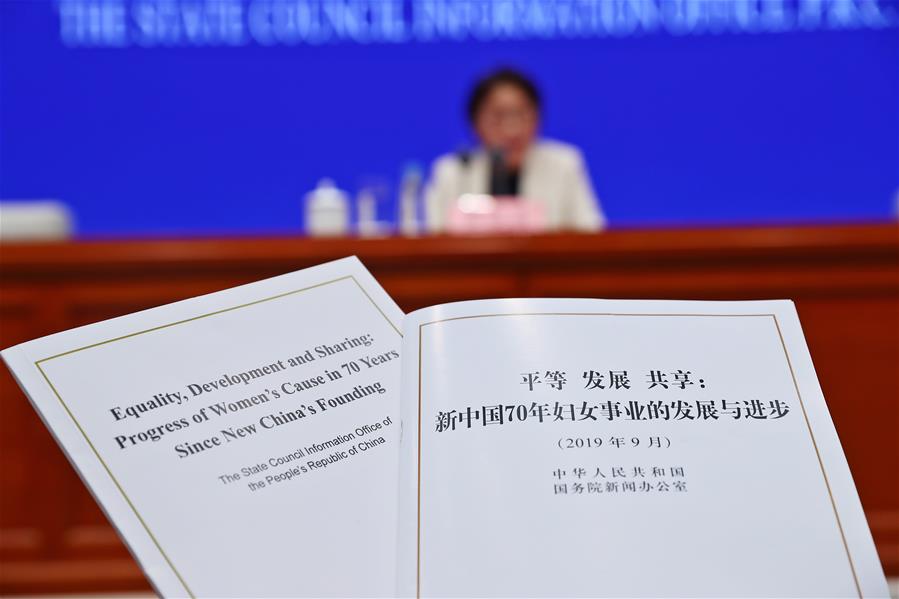China publishes white paper on progress of women's cause in 70 years
China on Thursday issued a white paper on the progress of women's cause in the past 70 years since the founding of the People's Republic of China (PRC).
China on Thursday issued a white paper on the progress of women's cause in the past 70 years since the founding of the People's Republic of China (PRC).

A white paper titled "Equality, Development and Sharing: Progress of Women's Cause in 70 Years Since New China's Founding" is released by the State Council Information Office in Beijing, capital of China, Sept. 19, 2019. [Photo/Xinhua]
The white paper, titled "Equality, Development and Sharing: Progress of Women's Cause in 70 Years Since New China's Founding," was released by the State Council Information Office.
The founding of the PRC in 1949 ushered in a new era for women in China, changing their social status from an oppressed and enslaved group in the past thousands of years to masters of their own fate, the white paper said.
As the Chinese nation is rising and growing richer and stronger, Chinese women's social status has undergone enormous changes, it said.
"The great achievements China has made in the development of women's cause is attributed to the leadership of the Communist Party of China (CPC)," said Huang Xiaowei, vice president of the All-China Women's Federation, at a press conference.
The progress made by Chinese women led by the CPC is not only of considerable significance to China's national rejuvenation but also a notable contribution to human civilization progress, Huang said.
As China's development has entered a new era, promoting gender equality and women's overall development at a higher level not only meets opportunities but also has a long way to go, the white paper said.
Under the guidance of Xi Jinping Thought on Socialism with Chinese Characteristics for a New Era, China will always adhere to safeguarding and improving women's livelihoods, promote women's all-round development, and lead hundreds of millions of women in working for national rejuvenation, it said.
More working women
China has promulgated laws and regulations to fully protect women's economic rights and interests, especially the right to equal employment, ensuring equal pay to men and women for equal work and eliminating gender discrimination in employment, the white paper said.
Women account for 40% of the labor force in China. In 2017, there were 340 million working women, doubling the figure in 1978.
Women's job options have greatly expanded. In 2010, 46.8% of women worked in industry and service sectors, up 24.8 percentage points from 1982.
Higher political status
China has drawn up and implemented laws to guarantee that women share equal rights with men to vote, to be elected, and to participate in the administration of state affairs, the white paper said, adding that over the past four decades since the reform and opening-up, new opportunities and channels have been opened to women to participate in politics.
In 2017, women accounted for 52.4% of public servants newly-recruited by the central government organs and their affiliates, and the proportion was 44% among local governments.
The ratio of women deputies to the 13th National People's Congress (NPC) was 24.9%, 12.9 percentage points higher than that of the first NPC in 1954.
More educated women
Chinese women's education level has been dramatically lifted over the past seven decades, according to the white paper.
The illiteracy rate among females aged 15 and above dropped from 90% before the founding of the PRC to 7.3% in 2017, which was a historic change.
The gender gap in the nine-year compulsory education has been basically eliminated. In 2017, the net primary school enrollment rates of boys and girls were both 99.9% while the proportions of girls in primary schools and junior high schools were 46.5% and 46.4% respectively, 18.5 and 20.8 percentage points higher than those in 1951 respectively
In 2017, the gross high school enrollment rate was 88.3%, with girls accounting for 47.7% of all students in high schools.
Meanwhile, women accounted for 52.5% of students in regular institutions of higher education, 28.4 percentage points higher than in 1978, 32.7 percentage points higher than in 1949.
Healthier women
Women's health has further improved in China. Women's average life expectancy grew to 79.4 years in 2015, an increase of 10.1 years over 1981 and 42.7 years over 1949, according to the white paper.
The maternal mortality rate has fallen 79.4% from 88.8 per 100,000 in 1990 to 18.3 per 100,000 in 2018, meaning that China has achieved the United Nations Millennium Development Goals ahead of time.

